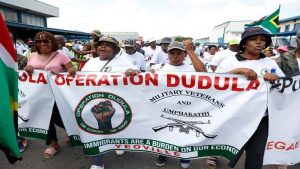Police remain on high alert at the Kalafong Tertiary Hospital in Atteridgeville, west of Pretoria where patients suspected to be foreign nationals were turned away by Operation Dudula. The movement says migrant patients should be documented before accessing services at the facility.
The hospital has since interdicted the movement. Operation Dudula has been picketing outside the hospital since the beginning of August. It says South Africans are not getting preferential treatment due to the influx of foreign nationals at healthcare facilities.
It wants those who are undocumented to pay for health services.
“We didn’t come here to hinder progress. We are saying the undocumented (foreign nationals) must pay. Management must enforce the laws. When an illegal immigrant comes to the hospital, because they are here illegally according to Section 17, after they have been discharged, that particular person must call law enforcement or immigration to take that person out of this country,” says the organisation’s Elias Magwadi.
The group allegedly turned away patients based on the colour of their skin and language spoken. Magwadi denies this.
“That is a false statement. We have been picketing peacefully. You know when you are a criminal, when you see law enforcement you run away. Those people, because they know Operation Dudula and they are here illegally, whenever we are here with our regalia they run away. We did not hinder anyone to go on the premises.”
Safety concerns
Police were once again called in as the protest escalated. Tensions rose between Dudula and Economic Freedom Fighters (EFF) members who are opposed to the protests.
Branches of the EFF in Atteridgeville Outside Kalafong Hospital.
A 37 week pregnant patient was denied care in Kalafong Hospital .The patient was also suffering from high blood pressure and had to instead seek help at a local clinic.#NoToXenophobia pic.twitter.com/3LHjCwnQtR
— EFF Gauteng (@EFFGautengProv) August 31, 2022
On Friday, the hospital obtained a court interdict against the protestors. Hospital CEO Dr Sello Matjila says they are worried about the safety of staff and patients.
“We are just worried about the safety of all our patients and staff. Our interdict had specific names, but we also interdicted any unknown individuals because these things are sporadic and not very well coordinated. We just don’t know whom we are dealing with. The interdict covers all the other individuals under the banner of Operation Dudula.”
The government says while it understands that the public health system is overburdened, Dudula’s actions are infringing on basic human rights.
NGO Doctors Without Borders has also weighed in on the matter. The organisation’s Dr Tasanya Chinsamy says no one should be deprived of the right to access healthcare services.
“People don’t realise that people who are referred to tertiary care are referred for a reason because this care is not available in primary care. We cannot manage those patients at a primary health level whether it’s because we don’t have the resources, the equipment, or personnel like specialists to do so. A lot of these patients require high-level care and specialist care. And what happens is if they don’t get this care their conditions can worsen. They can become very ill or they can die. It’s a domino effect.”
Operation Dudula says it will continue with its demonstration despite the interdict. It says the document only prevents them from turning away patients and not from picketing.





